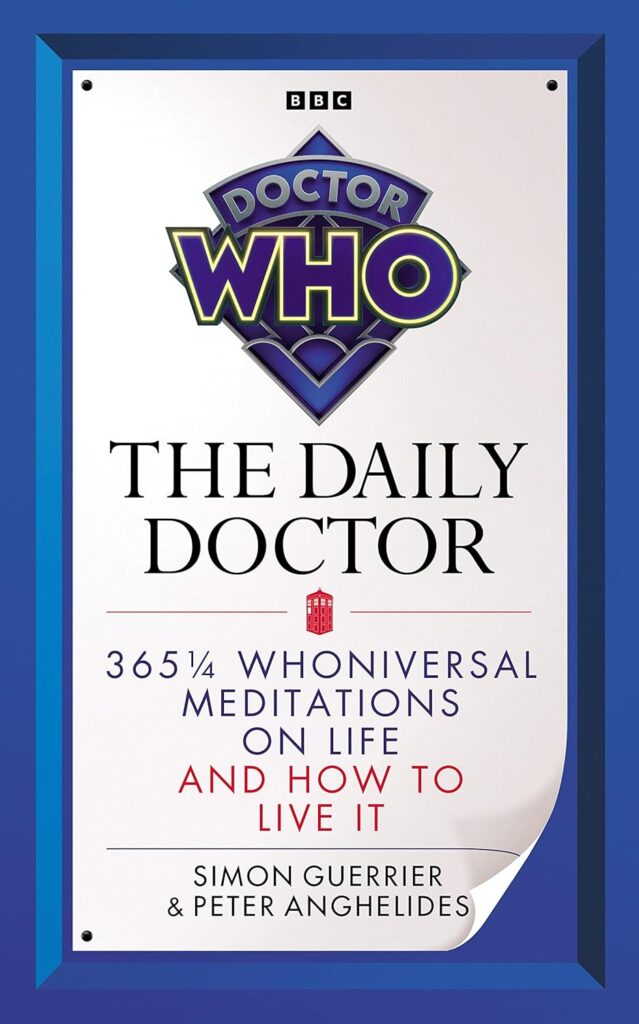Written by: Simon Guerrier and Peter Anghelides
Published by: BBC Books
Fact 1 – Doctor Who, as a program with 60 years of dialogue, heroism, villainy, folly and wisdom, can, if you let it, make you into a better human being. A kinder person, lit by enthusiasm, acceptance and inner strength, with maxims aplenty at your disposal to protect you – and others – from hate, greed, pettiness and the smallness of mind that often define the bullies against whom the Doctor stands and protects us.
Fact 2 – There is an insatiable demand in the world for mindfulness techniques, tips, and daily reminders not to burn our societies to the ground – if only to avoid the consequences.
We see this demand in everything from Thought For The Day to the endless memes of inspirational messages that clog up social media on a daily basis. TikTok and YouTube both have a flourishing sub-genre filled with content creators who specialize in making little uplifting moments and messages to help get an increasingly oppressed and psychologically bruised, exhausted world community through one more day of not burning everything to the ground and eating billionaires for brunch.
If you slam those facts together, The Daily Doctor feels like an inherently good idea – quotes from the show, followed by small paragraphs of meditation or application, to help us through to a place of personal improvement.
OK, But…
Which makes it vexing to report that in reality, it’s not a thing that necessarily works the way it absolutely feels like it should.
It’s…OK. Guerrier and Anghelides are both good writers with a strong command of Who-lore, and they mine the show’s history pretty well. Some of the application paragraphs and meditations work well by way of centring readers in a particular episode memory, but many tip over into tweeness. Now, absolutely, a certain amount of tweeness is on-brand for this kind of endeavour – again, TikTok creators make a living by adding a degree of non-threatening, unchallenging tweeness to their daily messages. Tweeness speaks to the Inner Child (which is probably the same part of our psyche that has us at 50 and above still investing in a TV show about a time-travelling alien in a police box), and soothes it, free of all the grit and grimness of a grwon-up reality. It’s the spoonful of sugar that helps reality go down.
It’s just that here, it feels like many of the daily meditations fall into the trap of Thought For The Day – or indeed, any potential sermon by an over-earnest vicar – of outlining a very specific situation in which we might find ourselves, and then uttering those deathly words “And you know, that’s a lot like Jesus…or indeed, the Doctor…”
The connection points between the Doctor’s situations and our own are where the tweeness lives and breathes in The Daily Doctor. But really speaking, that’s not the issue with the book.
The issue is that is shouldn’t be a book.
If you launched The Daily Doctor as a small, page-a-day calendar, with a glossy image from the adventure mentioned, the quote of the day, and the aphorism or meditation to be drawn from it, it would be brilliant, and the image-driven 21st century would lap it up.
If you dedicated not a hardback book but some web space and created an online Daily Doctor page people could visit to get their daily fill of Doctorish wisdom, it would be a gold mine, at least in terms of clicks, though you’d probably struggle to monetize it (as BBC Books has done here). A Daily Doctor Instagram account, or even an email that would send your Daily Doctor to your inbox, would play a blinder, combining imagery, quotation and meditation.
The real issue with The Daily Doctor is that it’s a book that doesn’t really work as a book – unless of course you’re someone with a pre-existing faith who’s used to randomly opening a big book with no pictures, reading what you find on the page, and applying it to your day. In which case, you’ll probably continue to do that, because of the promises of a pseudo-mystical quantum connection between the actions of you opening a book to a random page and the page’s relevance to your life. The Daily Doctor makes no claims to divine inspiration, and so would just be extra on top of that practice.
As a book, it’s chunky, it’s walls and walls of dry text, with no supporting or relieving imagery, only occasional prints of Gallifreyan script in the background to add distraction for the eye, and ultimately, unless you’re already in that habit of picking up a book every day and taking meditative lessons from it – which most people probably aren’t these days – it feels like a chore.
The Point of Disconnect
That’s unfortunate, because as we mentioned, Guerrier and Anghelides have mostly done a good job of compiling their little wisdom-titbits, and devising applications that could please a social media audience perfectly well.
In a sense, the disconnect between the good work that’d been done and the monetized delivery method feels like a challenge inherent in the BBC’s marketing model. The best way to put something like this together would have been in a highly visual format, but that would have been incredibly difficult to monetize via BBC online channels – particularly since there are plenty of people out there determined that the BBC’s funding model should be smashed to smithereens.
Putting out a book is a well-established way in which pre-existing content can be monetized – there is, after all, a whole division called BBC Books dedicated to that purpose – but in this instance, the easiest way of delivering the content and monetizing it…is also the least effective way of making the contact accessible to its potential users.
All in all then, there’s a good idea at the heart of The Daily Doctor, and some good work by two experienced and committed writers. It’s just that as a product, it’s an almost-total mismatch of intention and delivery.




Be the first to comment on "The Daily Doctor – Whoniversal Meditations On Life And How To Live It"